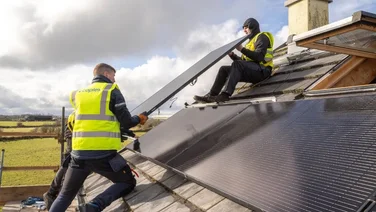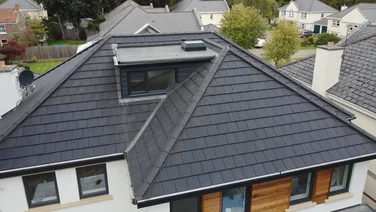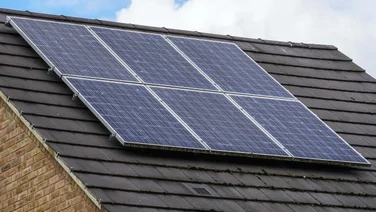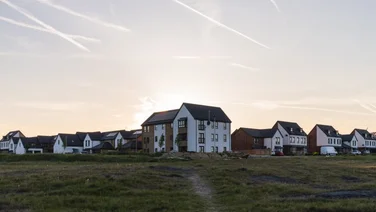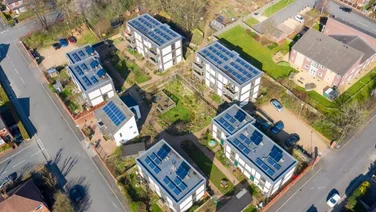Solar panels are pricey bits of kit, which makes them well worth protecting.
There are more than one million solar PV installations in the UK (source: BEIS), and this figure looks set to grow and grow.
If you want to reduce your solar panel costs, there are four key risks that you need to be mindful of:
- Improper installation
- Lack of maintenance/cleaning
- Pigeons and squirrels
- Professional thieves
Allow us to take you through our top seven ways for protecting your solar panels. If you’re solar panels are already broken, check out our guide on what to do if you have broken solar panels. You also need to be aware of how to maintain your solar panels, which we cover in our ‘How to maintain your solar panels‘ guide.

1. Take out insurance
This one’s a no-brainer. Whenever you buy anything expensive, it makes sense to take out insurance on it.
In the case of most UK-based insurance companies, it’s very easy to add your solar panels to your existing home insurance policy.
This is because an insurance company will usually consider solar panels as ‘permanent home fixtures’ – so long as the panels are fixed to your roof (as opposed to on the ground).
However, even if your solar panels are covered, make sure you factor them into the rebuild cost of your home – as this is the amount your home insurance is based on. A rise in the rebuild cost will naturally increase your premium slightly, but it’s worth it for the peace of mind.
Get this sorted and your solar panels will be protected against theft, vandalism, and damage by fire/water. If you want further cover for your panels (e.g. against other kinds of unintentional damage), you’ll need to take out accidental damage cover.
2. Get your panels installed properly
However exciting/independent a DIY solar panel installation sounds, it is categorically a very bad idea. Unless you’re an MCS-approved, professional solar panel installer and you do this for your 9-to-5, please leave this to the people with the know-how.
If you side-step the expense of a proper installation, you’ll be much more likely to face issues further down the line – such as broken connections, blown fuses, degraded wires, and moving panels.
Likewise, it pays to have a professional give your panels a maintenance check every 2-3 years. A stitch in time and all that.
3. Keep your panels clean
Although a largely miserable and damp affair, the UK’s regular rainfall does help to keep solar panels clean. Given the 35-40° tilt of most solar PV installations, all it takes is a bit of water and any dirt or debris is dislodged and deposited.
What’s more, most solar panels nowadays are made with a hydrophobic coating, which means water tends to run straight off.
However, there’s some dirt that just won’t budge, particularly if its had time to harden onto your panels during a hot day. What’s more, pigeons are drawn to solar panels (more on that below), and rainwater won’t always be able to clean off pigeon droppings.
Why is this an issue? Well, if you let dirt, dust and droppings build up on your solar panels, they will gradually become less efficient and produce less energy for your home.
It’s therefore very important that you give your solar panels a proper clean about once a year. You can either pay for professionals to do this or try it yourself, but make sure you don’t climb onto the roof to do it. This is dangerous and might result in a tumble.
Instead, you should clean your panels while standing on the ground. To do this, you’ll need to attach a soft sponge or cloth to a long pole. If you don’t possess a sufficiently long pole, you should be contacting the professionals. Shooting your panels with water from a hosepipe will not be enough.
If you want an eco-friendly roof that’s supposed to be an environment for animals, why not consider a green roof?
4. Deter pigeons and other critters
Unfortunately, pigeons will try their damnedest to ruin your solar panels.
To these birds, your expensive solar PV array is just a big, silicon nest for their feathery families. Pigeons will make a home for themselves in the cosy gap between your panels and your roof, and will gradually wreak havoc.
Not only will quantities of poo build up on top of your panels, but pigeons will also damage the wiring and affect the output of your system. Particularly hefty birds have been known to dislodge the MC4 clips that connect the wires to the back of your panels.
If you don’t notice any pigeons living under your solar panels, you may find that a family of squirrels has got there first. Armed with teeth, squirrels have the power to gnaw through the wires of your solar panels and mess things right up.
The solution? Fake birds of prey, or mesh barriers. Either will work. For more information, read our guide on how to keep pigeons away from your solar panels.
5. Cut back your trees
Don’t get us wrong: trees are fine things, and we respect their leafy splendour.
However, if you own solar panels, tall trees looming over the roof of your property are a problem. Not only is there a risk of branches falling and damaging the glass of your panels, but trees are also an invitation for birds to perch. And perching birds mean poo on your panels.
All it takes is one storm to dislodge a branch, or one bird to take a seat, and you could have some cleaning/maintenance to do.
It just isn’t worth the hassle. Make sure you’ve pruned your tree back so that no branches hang over your roof.
6. Set up an alarm system
Solar panel thieves – they’re out there, but you can stop them.
It’s only natural that the growing popularity of solar panels has drawn the attention of less savoury types. Put a standard 3.5kWp solar PV system on your roof and you’re basically advertising £5-6k worth of kit.
If you live in a particularly active area for burglaries, we advise that you set up a motion detection alarm system (if you haven’t already). It’s fairly easy to attach your panels to the alarm system, so that any movement of the panels will set off a noise, and alert you to what’s going on.
This is definitely worth your time and expense. It does not take professional thieves very long to dismantle and run away with an entire solar panel array. Remember the big Lincolnshire solar panel theft of 2018?
7. Mark your solar panels
If your solar panel comes with a serial number (which it probably will), note that number down. That way, if your solar panels do get stolen, you’ll be able to identify them again (should the opportunity arise).
If, on the other hand, your solar panels don’t have any obvious sign of identification, give them one. For example, you could use a knife and etch an ID number or strange word into the metal frame of each panel.
In summary
Just to recap, here are our seven top tips for keeping your solar panels safe from deterioration, damage, or theft:
- Take out insurance
- Get your panels installed properly
- Keep your panels clean
- Deter pigeons and other critters
- Cut back your trees
- Set up an alarm system
- Mark your solar panels
If you don’t yet have solar panels and you’d like to make the switch to solar, simply fill in this form with your details, and our professional suppliers will contact you.

